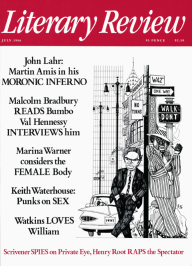John Lahr
Dark and Troubled Dreamland
The Moronic Inferno: and Other Visits to America
By Martin Amis
Jonathan Cape 192pp £9.95
‘I hope these disparate pieces add up to something’, writes Martin Amis with uncharacteristic diffidence in his introduction to this collection of occasional journalism ‘offered with all generic humility’. No time spent in Mr Amis’s company is ever wasted. He is a fine novelist who turns an elegant and often hilarious sentence. But even at the beginning of this volume, Amis seems to be hedging. ‘I should have worked harder,’ he jokes. ‘But it was quite hard work getting the stuff together (photocopying back numbers of journals can be a real struggle and that Xerox flap tangling you up and getting in the way).’ This comic disingenuousness is cute enough to forgive him almost anything, even misrepresentation. The Moronic Inferno, a terrific polemical title borrowed from Saul Bellow by way of Wyndham Lewis, promises social revelations, fierce debate, scandalous discoveries, a perilous descent into a barbarous society. But Amis turns out to be a day-tripper in an American theme park. Amis’s America is an amalgam of the top of the literary pops (Bellow, Capote, Updike, Roth, Didion, Burroughs) and yesterday’s headlines (von Bulow, Hefner, Reagan on the campaign trial, Jerry Falwell, the Atlanta killings). What emerges out of Amis’s suave Sunday supplement style is a genre of reportage best described by Jimmy Durante as ‘non-friction’.
The unexamined link in almost all of Amis’s essays is the psychopathic style – the ruthless, guiltless pursuit of self-interest – that Americans legitimize as success, and which drives both winners and losers in the American sweepstakes crazy. Everybody in these pages is making a killing: the literary kingpins peddling

Sign Up to our newsletter
Receive free articles, highlights from the archive, news, details of prizes, and much more.@Lit_Review
Follow Literary Review on Twitter
Twitter Feed
‘The Second World War was won in Oxford. Discuss.’
@RankinNick gives the question his best shot.
Nicholas Rankin - We Shall Fight in the Buttery
Nicholas Rankin: We Shall Fight in the Buttery - Oxford’s War 1939–1945 by Ashley Jackson
literaryreview.co.uk
For the first time, all of Sylvia Plath’s surviving prose, a massive body of stories, articles, reviews and letters, has been gathered together in a single volume.
@FionaRSampson sifts it for evidence of how the young Sylvia became Sylvia Plath.
Fiona Sampson - Changed in a Minute
Fiona Sampson: Changed in a Minute - The Collected Prose of Sylvia Plath by Peter K Steinberg (ed)
literaryreview.co.uk
The ruling class has lost its sprezzatura.
On porky rolodexes and the persistence of elite reproduction, for the @Lit_Review: